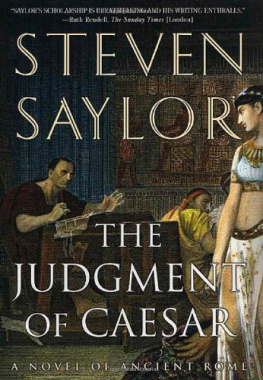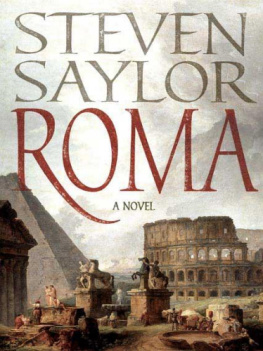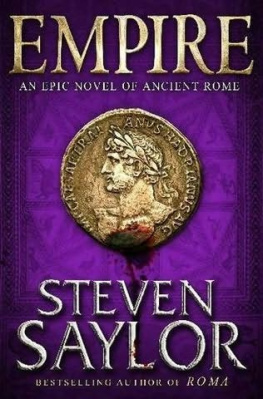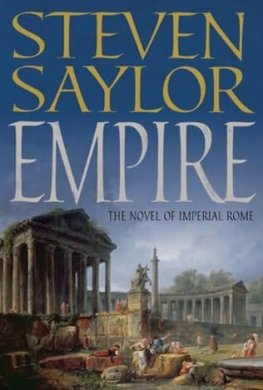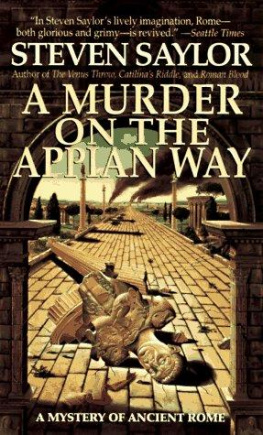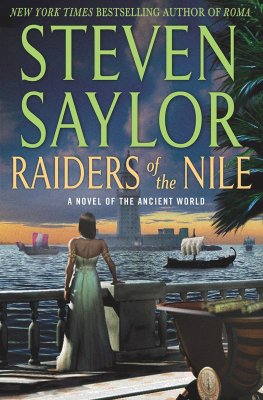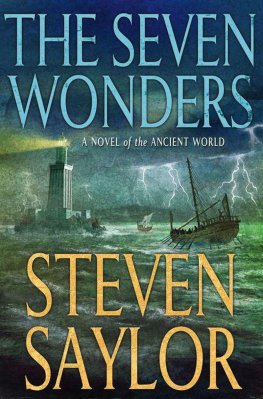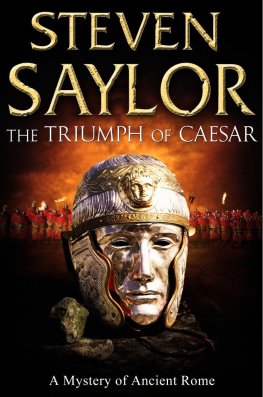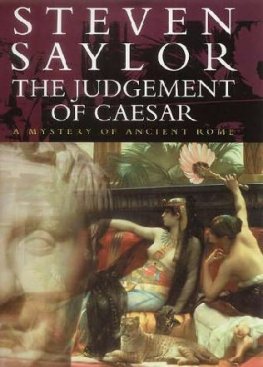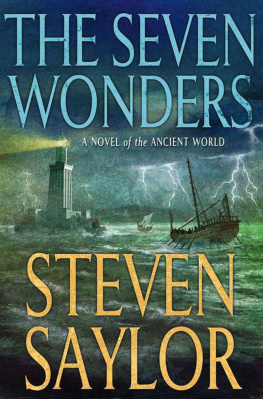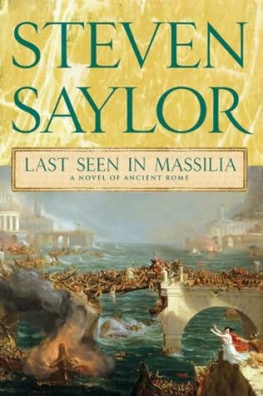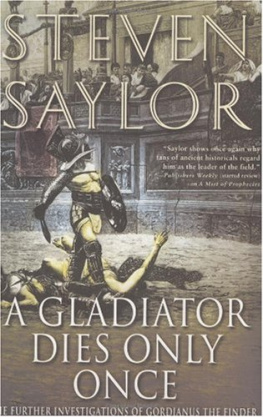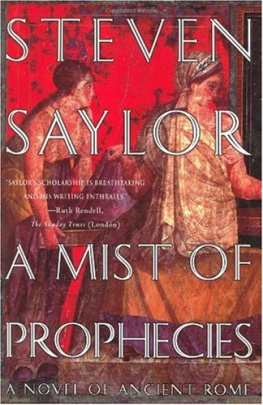Steven Saylor - The Judgment of Caesar: A Novel of Ancient Rome (St. Martins Minotaur Mystery)
Here you can read online Steven Saylor - The Judgment of Caesar: A Novel of Ancient Rome (St. Martins Minotaur Mystery) full text of the book (entire story) in english for free. Download pdf and epub, get meaning, cover and reviews about this ebook. year: 2005, publisher: St. Martins Press, genre: History. Description of the work, (preface) as well as reviews are available. Best literature library LitArk.com created for fans of good reading and offers a wide selection of genres:
Romance novel
Science fiction
Adventure
Detective
Science
History
Home and family
Prose
Art
Politics
Computer
Non-fiction
Religion
Business
Children
Humor
Choose a favorite category and find really read worthwhile books. Enjoy immersion in the world of imagination, feel the emotions of the characters or learn something new for yourself, make an fascinating discovery.
- Book:The Judgment of Caesar: A Novel of Ancient Rome (St. Martins Minotaur Mystery)
- Author:
- Publisher:St. Martins Press
- Genre:
- Year:2005
- Rating:3 / 5
- Favourites:Add to favourites
- Your mark:
- 60
- 1
- 2
- 3
- 4
- 5
The Judgment of Caesar: A Novel of Ancient Rome (St. Martins Minotaur Mystery): summary, description and annotation
We offer to read an annotation, description, summary or preface (depends on what the author of the book "The Judgment of Caesar: A Novel of Ancient Rome (St. Martins Minotaur Mystery)" wrote himself). If you haven't found the necessary information about the book — write in the comments, we will try to find it.
Steven Saylor: author's other books
Who wrote The Judgment of Caesar: A Novel of Ancient Rome (St. Martins Minotaur Mystery)? Find out the surname, the name of the author of the book and a list of all author's works by series.
The Judgment of Caesar: A Novel of Ancient Rome (St. Martins Minotaur Mystery) — read online for free the complete book (whole text) full work
Below is the text of the book, divided by pages. System saving the place of the last page read, allows you to conveniently read the book "The Judgment of Caesar: A Novel of Ancient Rome (St. Martins Minotaur Mystery)" online for free, without having to search again every time where you left off. Put a bookmark, and you can go to the page where you finished reading at any time.
Font size:
Interval:
Bookmark:
As night fell, the army reached a fortress somewhere to the east of Alexandria.
Vaguely I sensed that the wagon had come to a halt. I dozed, not from physical weariness but from a kind of mental stupor; only by descending into half-formed dreams could my mind escape from an intolerable reality compounded of tedium and dread, physical discomfort and numbing grief.
The shackles on my ankles were loosened. Something sharp poked me into alertness.
"Up, Roman!" The spy, assisted by a few soldiers, rousted us out of the wagon. My bones ached from being jostled all day over a particularly rutted stretch of road. My legs were weak from having been cramped for hours. I staggered like a cripple, with a spear at my back to keep me moving forward.
Great walls with huge ramparts of packed earth surrounded us. In the vast enclosure of the fortress, the army went about the business of unloading provisions and preparing for the night. The buildings within the fortress walls were mostly plain and utilitarian, but one stood out on account of its opulence. Magnificent columns painted in bright colors supported a roof of gleaming copper. It was to this building that the spy drove us.
With Rupa and the boys, I waited outside, ringed by soldiers, while the spy stepped within. He was gone for a considerable time. Above us, the desert sky was ablaze. The sinking sun illuminated crimson and saffron clouds that glowed like molten metal, then faded to the dull blue of cooling iron, then darkened into ever-deeper shades of blue fretted by silver stars. I had forgotten the awesome beauty of an Egyptian sunset, but the splendor of the dying day brought me only misery. Bethesda was not there to share it with me.
At length the spy returned, looking pleased with himself. "What a lucky day for you, Roman! You shall have the great honor of meeting Captain Achillas himself!"
The murderer? I very nearly said. It was hard to imagine how else the killing of Pompey could be characterized. Clearly, Achillas was a man from whom I could expect no mercy.
Serpent-headed lamps atop iron tripods lined a long hallway decorated with a riotous profusion of hieroglyphs. The spy led us into a high-ceilinged chamber decorated in a fashion more Greek than Egyptian, with geometric rugs underfoot and vast murals depicting battles painted on the walls. Scribes and other clerics scurried here and there across the large space. At the center of all this motion were two men of very different countenance, their heads close together as they engaged in a heated conversation.
I recognized Achillas at once, from having seen him on Pompey's galley. He was outfitted in the various regalia that marked him as Captain of the King's Guards, with a red horsetail plume adorning his pointed helmet. His tanned face looked very dark, and his brawny physique seemed positively bull-like next to the pale, slender figure who stood beside him. The slighter man had a long face and arresting green eyes. His yellow linen robes had a hem of gold embroidery, across his forehead he wore a band of solid gold, and a magnificent pectoral of gold filigree adorned his narrow chest. He was much too old to be King Ptolemy, yet he had the look of a man used to giving orders and being obeyed.
As we approached, the two of them looked our way and stopped conversing.
The spy bowed so low that his nose almost touched the ground. As a Roman, I was unused to seeing such displays of servility, which are part of the very fabric of Egyptian life, and indeed, of life in any state headed by an absolute ruler. "Your Excellencies," the spy hissed, keeping his eyes lowered, "here is the man I spoke of, the Roman spy whom I apprehended this morning near the abandoned shrine of Osiris, downriver from Naucratis."
The two men looked at me-though the term man was not entirely suited to the pale fellow, I thought, as I began to perceive that he was very likely a eunuch-another feature of court life in hereditary monarchies to which Romans are unaccustomed.
Achillas looked at me and scowled. "What did you say he calls himself?"
"Gordanius, Your Excellency."
"Gordianus," I corrected him. The steady tone of my voice surprised even me. Used to hearing their underlings speak in hushed, toadying voices, Achillas and his companion appeared taken aback to hear a captive speak up for himself while daring to look them in the eye.
The Captain of the King's Guards furrowed his brow. His companion stared at me without blinking.
"Gordianus," Achillas repeated, scowling. "The name means nothing to me."
"As I said, Excellency, he was seen on Pompey's galley, even while you yourself were departing with the so-called Great One on board the royal skiff."
"I didn't notice him. Gordianus? Gordianus? Does it mean anything to you, Pothinus?"
The eunuch pressed his fingertips together and pursed his lips. "Perhaps," he said, and clapped his hands. A scribe appeared at once, to whom Pothinus spoke in low tones while staring at me thoughtfully. The scribe disappeared through a curtained doorway.
"And these others?" said Achillas.
"The Roman's traveling companions. As you can see-"
"I wasn't talking to you," snapped the captain. The spy winced and groveled.
I cleared my throat. "The big fellow is called Rupa. Born mute, but not deaf. He was a strongman with a mime troupe in Alexandria before he came to Rome. Through an obligation to his late sister, I adopted him into my family. He's a free man and a Roman citizen now. The two slave boys are brothers. Even among the three of them, I'm not sure one could scrape up the wits to produce a passable spy."
"Master!" protested Mopsus and Androcles in a single high-pitched voice. Rupa wrinkled his brow, not quite following the train of my comment; his simpleness had the virtue of making him a hard man to insult.
Achillas grunted and suppressed a smile. The eunuch's face was impassive, and remained without expression when the scribe came hurrying back, bearing a scroll of papyrus. The scroll had been rolled to a specific passage, to which the scribe pointed as he handed it over to Pothinus.
" 'Gordianus, called the Finder,' " Pothinus read. "So you are in my book of names, after all. 'Roman, born during the consulship of Spurius Postumius Albinus and Marcus Minucius Rufus in the Year of Rome 643-that would make you, what, sixty-two years old? And looking every day of it, I must say! 'Wife: half-Egyptian, half-Jewish, called Bethesda, formerly his slave (acquired in Alexandria), mother to his daughter. Two sons, both adopted, one freeborn and called Eco, the other slave-born and called Meto-about whom, see addenda.' " Pothinus looked pointedly at the scribe, who lowered his head like a scolded dog and ran off to fetch another scroll. The eunuch was about to continue reading when, catching sight of someone behind me, he abruptly assumed a subservient posture, with his hands at his sides and his head bowed. Achillas did the same.
The piping of a flute accompanied the arrival of the young king. All activity in the large chamber ceased. The various scribes and officers stopped whatever they were doing, as if petrified by Medusa. Some hierarchy, unclear to me, apparently allowed some of them to remain standing while others dropped to their knees, and still others prostrated themselves entirely, falling flat on their faces with arms outstretched. If I was in doubt as to the procedure incumbent on me, the spy informed me of it.
"Drop down, you Roman dog! Down on your knees, with your face to the floor!" He punctuated this order with several pokes to my ribs.
I caught only a glimpse of the king, resplendent in robes of gold and silver and wearing the cobra-headed uraeus crown. With my hands tied behind me, it was not easy to drop to my knees and lower my face to the floor. The posture was humiliating. Behind me I heard Androcles whisper to his brother, "Look at the master with his backside stuck up in the air!" This was followed by a tiny yelp as the spy kicked Androcles to remind him that he had assumed the same vulnerable posture. The spy then dropped to his knees, just as the king and his retinue came striding by.
Font size:
Interval:
Bookmark:
Similar books «The Judgment of Caesar: A Novel of Ancient Rome (St. Martins Minotaur Mystery)»
Look at similar books to The Judgment of Caesar: A Novel of Ancient Rome (St. Martins Minotaur Mystery). We have selected literature similar in name and meaning in the hope of providing readers with more options to find new, interesting, not yet read works.
Discussion, reviews of the book The Judgment of Caesar: A Novel of Ancient Rome (St. Martins Minotaur Mystery) and just readers' own opinions. Leave your comments, write what you think about the work, its meaning or the main characters. Specify what exactly you liked and what you didn't like, and why you think so.

